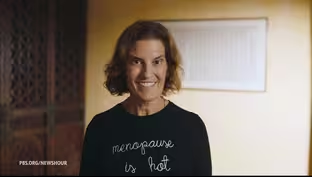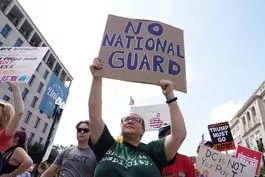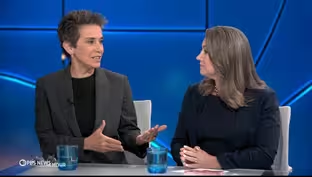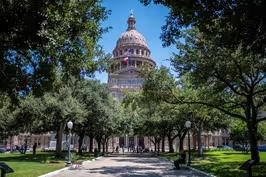
How Trump's immigration policies are affecting caregivers
Clip: 8/11/2025 | 8m 29sVideo has Closed Captions
How Trump's immigration policies are affecting caregivers and nursing homes
More than one million immigrants work in healthcare and make up an increasing share of caregivers for elderly and disabled Americans. That includes not only medical professionals, but also workers who keep facilities running. The industry already faces labor shortages, and the Trump administration’s immigration policies could make it more difficult to find workers. William Brangham reports.
Problems playing video? | Closed Captioning Feedback
Problems playing video? | Closed Captioning Feedback
Major corporate funding for the PBS News Hour is provided by BDO, BNSF, Consumer Cellular, American Cruise Lines, and Raymond James. Funding for the PBS NewsHour Weekend is provided by...

How Trump's immigration policies are affecting caregivers
Clip: 8/11/2025 | 8m 29sVideo has Closed Captions
More than one million immigrants work in healthcare and make up an increasing share of caregivers for elderly and disabled Americans. That includes not only medical professionals, but also workers who keep facilities running. The industry already faces labor shortages, and the Trump administration’s immigration policies could make it more difficult to find workers. William Brangham reports.
Problems playing video? | Closed Captioning Feedback
How to Watch PBS News Hour
PBS News Hour is available to stream on pbs.org and the free PBS App, available on iPhone, Apple TV, Android TV, Android smartphones, Amazon Fire TV, Amazon Fire Tablet, Roku, Samsung Smart TV, and Vizio.
Providing Support for PBS.org
Learn Moreabout PBS online sponsorshipAMNA NAWAZ: More than a million immigrants work in health care in the U.S., and they make up an increasing share of caregivers for elderly and disabled Americans.
That includes medical professionals, but also the housekeepers and the janitors that keep nursing homes running.
These facilities already face labor shortages.
And now, as William Brangham reports, the Trump administration's immigration policies could make it even more difficult to find workers.
WILLIAM BRANGHAM: The place that has been Edelyne Jean home for 18 years suddenly doesn't feel that way anymore.
EDELYNE JEAN, TPS Recipient: I came for a better life.
WILLIAM BRANGHAM: She fled her native Haiti and settled in Florida.
After the devastating 2010 earthquake, the Obama administration granted her and thousands of other Haitians temporary protected status, or TPS, which allowed them to remain in the United States and work legally, but didn't provide a path to permanent residency.
As TPS for Haitians was repeatedly extended, Edelyne got married, bought this house.
She also had a daughter, who is 6 and is an American citizen.
She enrolled in school, working first as a nursing assistant, and then as a registered nurse in nursing homes.
EDELYNE JEAN: I love what I'm doing, and I do it with pride and the compassion.
Like, I feel for these people.
Like, some of them, they have no family members.
We are the family.
We are family.
WILLIAM BRANGHAM: Do you feel like you have become an American?
EDELYNE JEAN: I tried.
Like, I do the right thing.
I tried to be one of them, to be part of America.
But I don't think we're welcome, I'm welcome, especially with this administration.
No.
WILLIAM BRANGHAM: In February, even as armed gangs expanded control over parts of Haiti, the Trump administration sought to end TPS for Haitians and send them back.
DONALD TRUMP, President of the United States: They're pouring into our country, pouring in.
If I weren't elected president, there'd be nobody in Haiti anymore.
WILLIAM BRANGHAM: The move was just one of several efforts to rescind the status of thousands of noncitizens working legally across the United States.
Is this something you're worrying about every single day?
EDELYNE JEAN: Every single day.
And I don't know how long do I have.
WILLIAM BRANGHAM: Haitians on TPS were granted a reprieve last month when a federal district court judge ruled that the deadline for ending TPS must be extended to next February.
But that's little comfort for Edelyne and her family.
EDELYNE JEAN: If nothing happens, I'm screwed, because, if I can't work to take out the bills, I won't be able to take out my daughter.
And I don't know.
I can't even think about it.
WILLIAM BRANGHAM: The looming end of TPS is not just a crisis for Edelyne and the hundreds of thousands of other Haitians here in the U.S.
It's also putting extraordinary strain on long-term health care facilities, like nursing homes, where a little over 7 percent of the work force are noncitizens.
DR. DAVID HIMMELSTEIN, HUNTER COLLEGE: There are already huge numbers of vacancies for nursing home workers and for home care workers.
And if the immigrants who are now filling those jobs go away, they just won't be filled is almost certainly what's going to happen.
WILLIAM BRANGHAM: Dr. David Himmelstein is a professor of public health at New York's Hunter College.
He says staffing issues with nursing homes ripple through the broader health care system.
DR. DAVID HIMMELSTEIN: Hospitals and emergency rooms to panned on nursing homes.
They can't discharge patients who are not able to care for themselves unless there's a nursing home to take care of them or home care workers to take care of them.
And that's going to mean backups.
WILLIAM BRANGHAM: At the Sinai Residences in Boca Raton, Florida, these policy changes could mean dozens of workers might lose their jobs.
This facility includes independent and assisted living, a nursing home and a memory care unit.
Job losses would include health care workers, but also support positions like maintenance staff and housekeepers like Vanessa Joseph.
She came to the U.S. from Haiti two years ago with a younger sister and her teenage son.
She's legally working under TPS.
VANESSA JOSEPH, TPS Recipient: I cry every day.
But I don't tell my son that because he can have more -- more stress than me.
So I tell him it's going to be OK.
So I just stay positive.
WILLIAM BRANGHAM: In your heart of hearts, do you believe that it's going to be OK?
VANESSA JOSEPH: Not 100 percent, no.
RACHEL BLUMBERG, President & CEO, Toby & Leon Cooperman Sinai Residences: They're not just employees.
They end up becoming family members, friends and companions.
WILLIAM BRANGHAM: Rachel Blumberg is the CEO of the Sinai Residences.
RACHEL BLUMBERG: They have children.
They are homeowners.
They are hardworking.
They are not criminals.
KRISTI NOEM, U.S.
Homeland Security Secretary: This president is standing up.
WILLIAM BRANGHAM: In June, Blumberg had to let 10 workers go when the Trump administration ended a humanitarian work permit program that had been started by the Biden administration.
RACHEL BLUMBERG: There were a lot of questions of, what have I done wrong?
And my answer to them was that, you have done absolutely nothing wrong.
It's unfortunately just where you were born, which doesn't seem fair at all.
It was, I would have to say, the hardest day of my entire 30-year career in senior living.
WILLIAM BRANGHAM: Blumberg says losing these workers would not only be hard on their own lives, but on the many residents at Sinai who've developed long and deep relationships with them; 92-year-old Isobel Loring has lived at Sinai for almost a decade, and she's grown very close to Vanessa.
ISOBEL LORING, Resident, Sinai Residences: Well, you take care of us?
And I'd like to take care of you.
VANESSA JOSEPH: Thank you.
I appreciate it.
ISOBEL LORING: I know.
VANESSA JOSEPH: I love you.
ISOBEL LORING: I love you too.
The people I care about are the people that are working with us, that are helping us, that are here for us when we need them under all circumstances.
If these people are not being allowed to work, there won't be people to take care of us.
These communities that have elderly people, there are no Americans that really want to do those jobs.
WILLIAM BRANGHAM: Vanessa's earnings help support her mom and other family back in Haiti.
She says, regardless of what happens with TPS, the gang violence there means going back is impossible.
VANESSA JOSEPH: I like work here.
We are family here.
But it's so hard, hard, hard to go back in Haiti.
I can't.
Sometimes, I would like to see my mom, hug her because she's sick, but I can't.
RACHEL BLUMBERG: We're already looking at, unfortunately, replacing them.
It's not what I want to do, but we're a 24/7 operation.
We have to have our caregivers and our essential workers there.
WILLIAM BRANGHAM: The Trump administration is still determining next steps in the court case that delayed the end of TPS to early next year.
In a recent statement, the Department of Homeland Security said: "President Trump and Secretary Noem are restoring common sense to our immigration system and returning TPS to its original status, temporary."
EDELYNE JEAN: Come here.
Come here.
WILLIAM BRANGHAM: Back outside Orlando, nurse Edelyne Jean is bracing for the next shoe to drop.
If it comes down to the government saying you have to leave, will you go back to Haiti or will you try to go somewhere else?
EDELYNE JEAN: I don't see myself going back to Haiti, because, if I go, they will kill you.
Eventually, they will.
So I'm not going.
And I have my daughter too.
She was born here.
She belongs here.
WILLIAM BRANGHAM: With federal immigration policy changing almost daily, Edelyne is left worried that the life she has built in America could soon come to an end.
For the "PBS News Hour," I'm William Brangham in Central Florida.
Al Jazeera’s Anas al-Sharif killed by Israeli strike in Gaza
Video has Closed Captions
Clip: 8/11/2025 | 4m 38s | Al Jazeera’s Anas al-Sharif and 4 other journalists killed by Israeli drone strike in Gaza (4m 38s)
A Brief But Spectacular take on better women's health care
Video has Closed Captions
Clip: 8/11/2025 | 3m 16s | A Brief But Spectacular take on revolutionizing women's health care (3m 16s)
The legality of Trump's D.C. takeover
Video has Closed Captions
Clip: 8/11/2025 | 8m 1s | The legality of Trump's D.C. takeover as statistics show decline in crime (8m 1s)
Tamara Keith and Amy Walter on Trump’s D.C. takeover
Video has Closed Captions
Clip: 8/11/2025 | 8m 23s | Tamara Keith and Amy Walter on Trump’s federal takeover of Washington, D.C. (8m 23s)
'We're allowed to be partisan,' Texas Republican says
Video has Closed Captions
Clip: 8/11/2025 | 6m 12s | 'We're allowed to be partisan' in drawing congressional maps, Texas Republican says (6m 12s)
Providing Support for PBS.org
Learn Moreabout PBS online sponsorship
- News and Public Affairs

FRONTLINE is investigative journalism that questions, explains and changes our world.

- News and Public Affairs

Amanpour and Company features conversations with leaders and decision makers.












Support for PBS provided by:
Major corporate funding for the PBS News Hour is provided by BDO, BNSF, Consumer Cellular, American Cruise Lines, and Raymond James. Funding for the PBS NewsHour Weekend is provided by...




